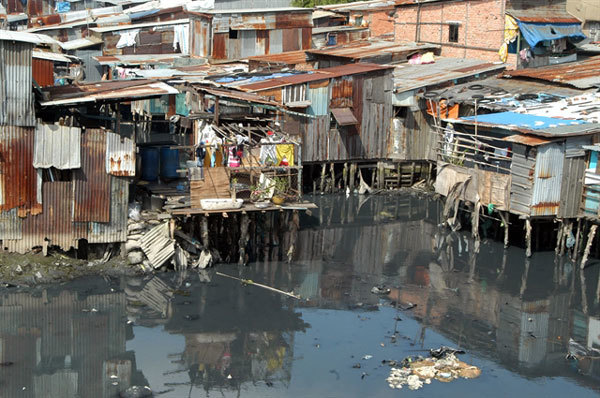 |
| Houses in a slum along a canal in District 8 in HCM CIty. VNA/VNS Photo Thanh Phan |
Can you explain how a report on population and housing in HCM City found that only 39 families were homeless?
In the 2019 national census, the criteria defining people with houses followed guidelines laid down by the Ministry of Construction and the General Department of Statistics. In that document, there were two definitions of a house – a simple or cheap house; and a solid brick house. The document also included shanty houses – places where poor migrants live, particularly those living in districts 1 and 4 and some outlying districts. In real life, some families have turned staircases into their living rooms. In such cases, we considered them as having dwelling places.
Do you mean that the concept of housing ownership is not taken into consideration in the statistics?
The statistics did not look at home ownership. We only focused on who was living in each house. In other words, these are dwelling statistics.
A dwelling place is not only an apartment or a house – it is a place where people have all the necessary conditions to live in. Of course, some people who are on social welfare benefits live in sheltered accommodation, and we have a special section for them in the survey.
For people who live on the streets, we also have a special section for them as well because many of them have homes to go to but don't want to live with their relatives.
Can you tell us something about the 39 families in HCM City who don’t have houses to live in?
Under the Law on Statistics, we’re not allowed to reveal any personal information. The only information we can provide to the media is that in District 1, District 4 and Can Gio District, there are 39 cases in all.
During the survey in District 1, I went to a place where six people were living in a space of just 6sq.m, and they had lived there for many years. Local authorities know about their situation but have been unable to do anything.
Many people have cast doubts on the results of the survey because it says only 8.9 million people live in HCM City, while the common assumption is that figure is more like 14-15 million. How did you arrive at 8.9 million?
In the survey, anyone who had lived in HCM City for more than six months was classed as a permanent resident – regardless of whether they had registered or not. People who had been in the city for less than six months but had long-term plans to stay were also included as permanent residents.
I think the higher figure includes visitors, people who live in neighbouring provinces but commute to the city for work, and people visiting for medical reasons.
Will you please explain why the report even includes the marital status of people aged from 15 upwards?
This concept is from the United Nations. What we were looking for was couple who live together, regardless of whether they were legally married.
A survey on population and housing is conducted every 10 years and is very costly. However, it seems the information released to the public is rather basic. Is that right?
These are only the initial results. The Statistics Office still has a mountain of work to do to handle the inputs from the survey. According to the schedule, in the last quarter of 2019 we’ll release a more in-depth report on the survey. And then in 2020, more info about the survey will be made public. Of course, we also need time to collect data from other provinces and cities.
The results of the survey will be used by authorities to develop policies related to the economy, culture and society.
VNS
 Vo Thanh Sang, deputy director of the HCM City Department of Statistics, explains to Tuổi Trẻ (Youth) Online the concept of dwelling houses in the wake of a recent population and housing survey.
Vo Thanh Sang, deputy director of the HCM City Department of Statistics, explains to Tuổi Trẻ (Youth) Online the concept of dwelling houses in the wake of a recent population and housing survey.